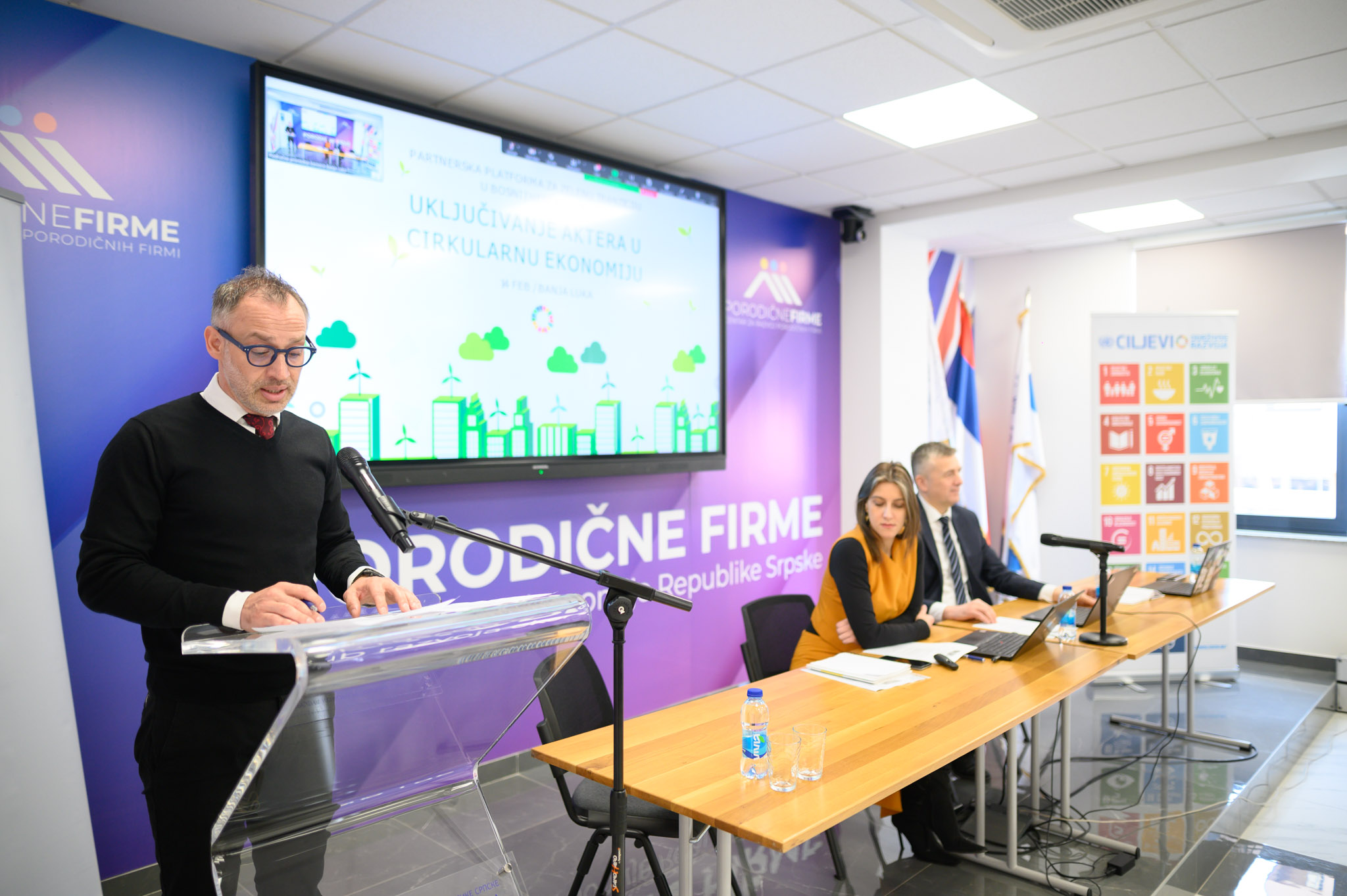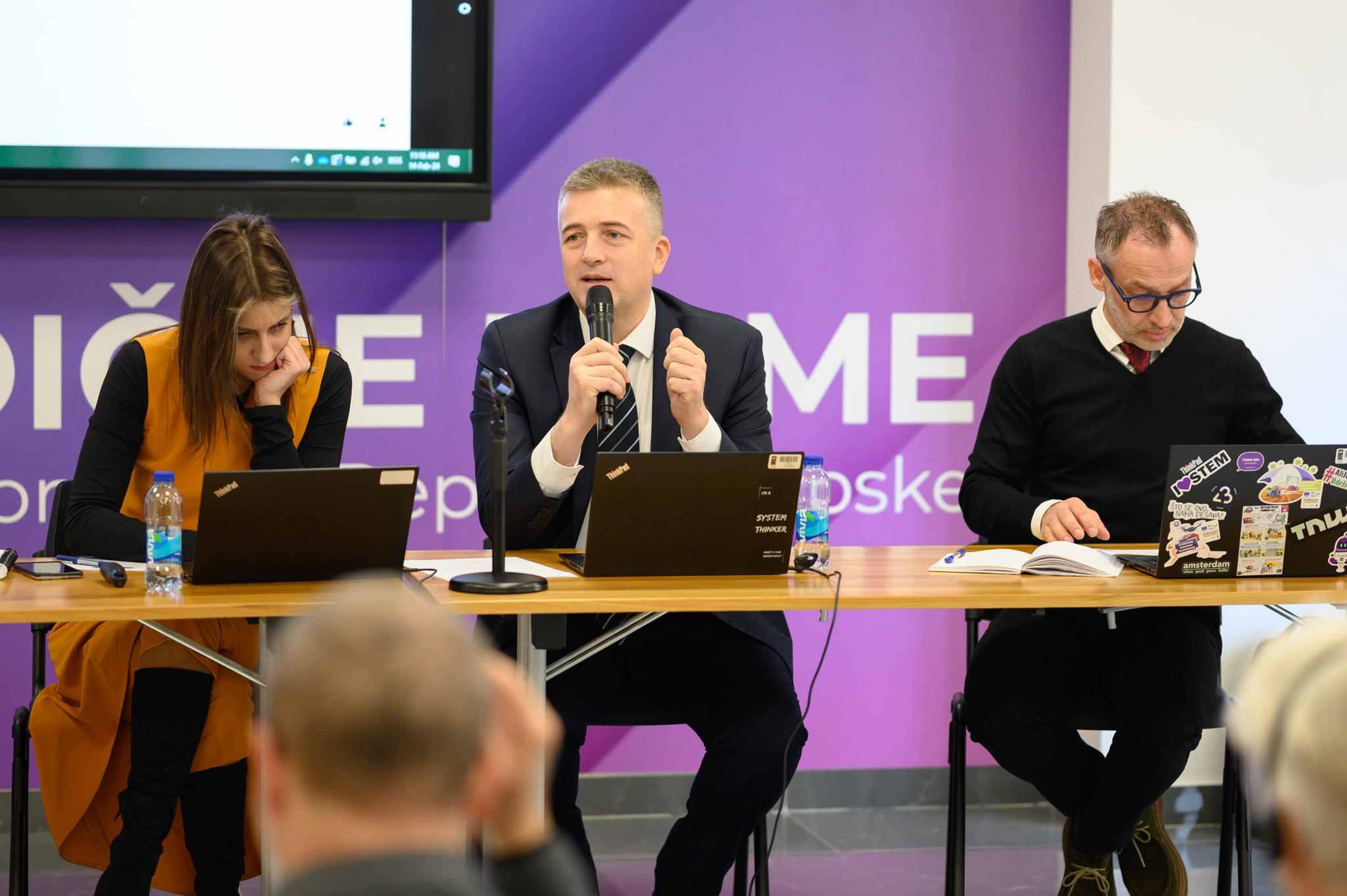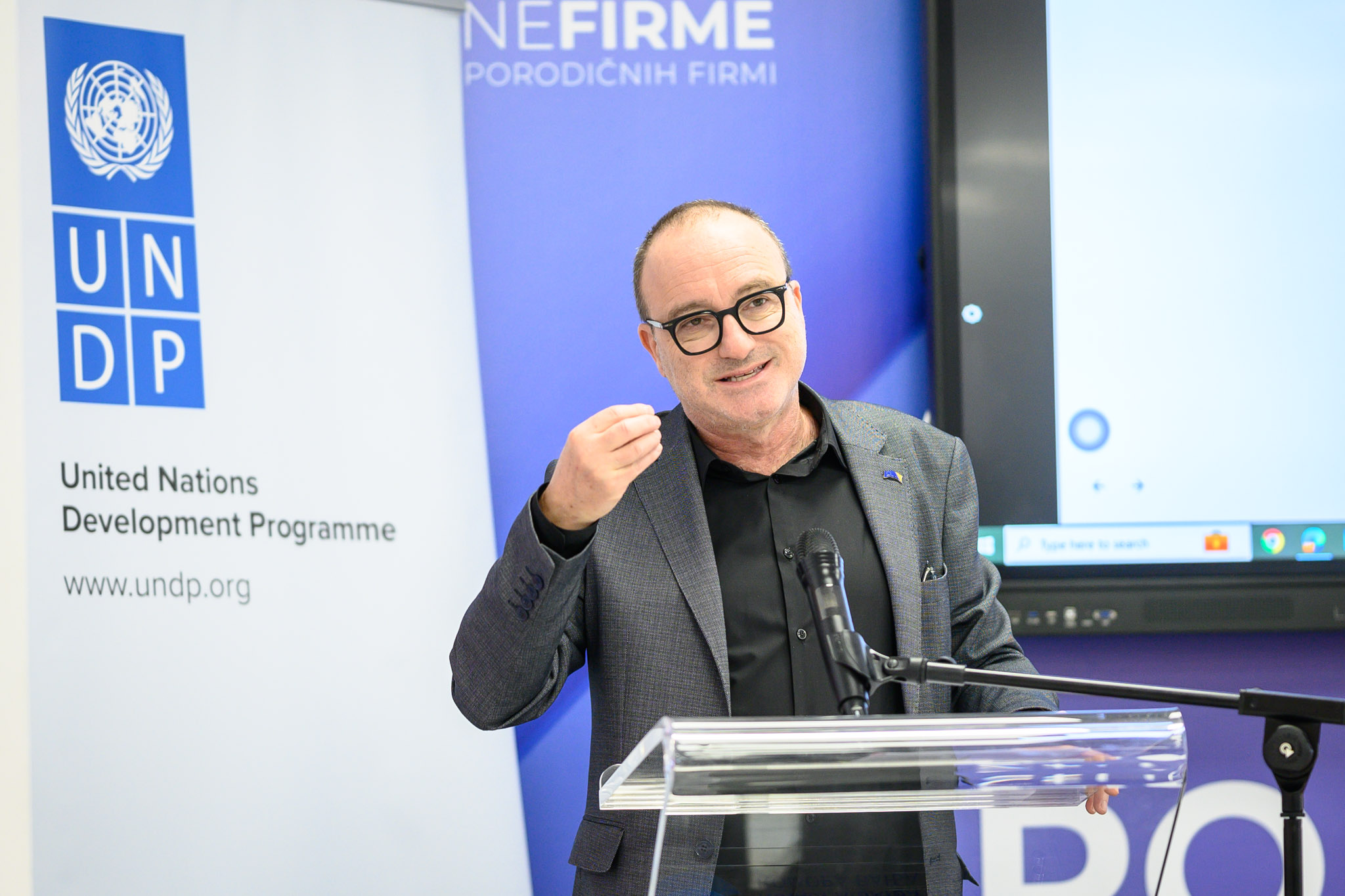The United Nations Development Programme (UNDP) in Bosnia and Herzegovina organized a meeting with stakeholders from the public and private sectors at the Chamber of Commerce of Republika Srpska in Banja Luka on February 14, 2024, with the aim to exchange experiences and ideas for advancing development of the circular economy, crucial for the green and sustainable future.
Advancing Circular Economy in Bosnia and Herzegovina Towards Green Transition and Sustainable Future
February 15, 2024

The United Nations Development Programme (UNDP) in Bosnia and Herzegovina organized a meeting with stakeholders from the public and private sectors at the Chamber of Commerce of Republika Srpska in Banja Luka on February 14, 2024, with the aim to exchange experiences and ideas for advancing development of the circular economy, crucial for the green and sustainable future. This is the second meeting convened under the Green Transition Partnership Platform, initiated by UNDP to establish a systemic approach and foster stronger collaboration in implementing the green transition in Bosnia and Herzegovina, aligned with the EU Green Agenda for the Western Balkans. The long-term vision of this platform is a just transition to an economy and society with net-zero greenhouse gas emissions by 2050. To strategically address this challenge, the platform encompasses four key interrelated areas, including decarbonization and climate change resilience, circular economy, air pollution reduction, and environmental and biological diversity protection.
The concept of the circular economy has been increasingly significant in recent years, both in scientific research and in the formulation of various public policies. The circular economy, as a regenerative economic system, focuses on waste reduction and resource lifecycle extension through circularity and extended production cycles, contrasting with the linear economy based on natural resource exploitation. Over the past twenty years, global material consumption has increased by over 65%, with alarming statistics on food and electronic waste, posing threats to the environment and health. In addition to addressing the negative environmental impact of the linear economic model, the application of circular economy principles also leads to the enhancement of the country's economy and sustainable development without compromising quality of life or profit.

Zorica Ljepojević, Head of the Department of Industry at the Ministry of Economy and Entrepreneurship of Republika Srpska, emphasized that the transition to a green and circular economy is prioritized in the Industrial Development Strategy of Republika Srpska and the Strategy for the Development of Small and Medium Enterprises. She added that in the coming period, the focus will be on supporting entrepreneurs through information dissemination, raising awareness, and training to enable this important transition. She also highlighted plans to provide financial support to projects aimed at innovating technological processes to improve resource efficiency, energy efficiency, utilization of renewable energy sources, waste reduction, and promotion of recycling and material reuse.
In his presentation on the circular economy within the context of the EU Green Deal, Stefano Ellero, Head of Cooperation at the Delegation of the European Union to Bosnia and Herzegovina, highlighted that the EU is developing a comprehensive framework to support the transition to a circular economy, encompassing various initiatives.

Anders Ladefoged, Coordinator of the European Circular Economy Platform, welcomed this event, expressing hope for continued collaboration on similar initiatives. He introduced the Circular Economy Platform, established seven years ago in partnership with EU institutions. The platform is a key instrument for EU initiatives in this area, ensuring the successful implementation of existing regulations. He emphasized that the platform, with over 100 best practices and more than 64 strategies, is expanding, attracting an increasing number of companies.
Ismar Ćeremida, Head of the Sustainable Growth Sector at UNDP in Bosnia and Herzegovina, emphasized that Bosnia and Herzegovina has significant potential for economic benefit from the circular economy model, and in this regard, UNDP provides continuous support to the country in transitioning to a green, circular economy.
Representatives of UNDP presented the Green Transition platform (www.zelenatranzicija.ba), created to gather key information and resources in this area for the private and public sectors, among others. In addition, this platform will facilitate dialogue through forums and other interactive tools to enable exchange.
Nina Meglič, Coordinator at the Strategic Research and Innovation Partnership - Circular Economy Transition Network (SRIP) from Slovenia, presented their achievements, good practices, and lessons learned from their experience. The long-term effect of SRIP includes contributing to Slovenia's recognition as a circular economy center, setting benchmark standards for top professionals and foreign investors through its knowledge, research and development infrastructure, technologies and services, as well as regulatory support to the environment. She also invited participants from Bosnia and Herzegovina to join and present their initiatives at the annual conference in Portorož, the largest event in the region on circular economy, as well as at the event SRIP will organize on this topic next year. She emphasized the importance of collaboration in developing circular economy models, as well as raising awareness.
Dušica Pešević, Professor of Environmental Protection at the University of Banja Luka, presented the current state and challenges in the field of circular economy in Bosnia and Herzegovina, emphasizing its insufficient development and unknown in the country. For successful development of the circular economy in Bosnia and Herzegovina, a more developed market, better infrastructure, funding and incentives, stronger institutional capacities, addressing legal challenges, as well as complex administrative and technical procedures, and improved awareness are needed. She highlighted waste management as a key element that can be effectively addressed through the circular economy. Bosnia and Herzegovina must do more in waste selection, prevention of waste accumulation, and reduction of packaging waste, striving to design products that will last longer and be reusable. She also demonstrated positive examples, such as places for disposing of packaging waste, composting used by households for organic waste.
The meeting concluded with a summary of ideas and proposals, paving the way for operational steps towards enhancing the circular economy in Bosnia and Herzegovina.

 Locations
Locations

